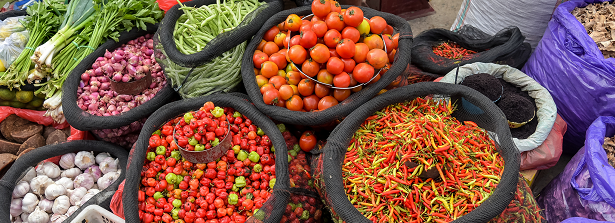Valuable Vegetables – Learning loops for impact in the international horticultural sector

The initiative Valuable Vegetables started early April 2019 with an expert meeting in The Hague. Dutch horticulture experts provided input for the agenda of the envisaged multi-stakeholder learning loops, which have the aim to improve practices and policies in the international horticultural sector, particularly in low- and middle-income countries (LMICs). Priority knowledge and learning subjects mentioned: 1. how to foster the sustainability of horticulture business models; 2. capacity strengthening and education of horticulture entrepreneurs; 3. effective public-private collaboration in adapting Dutch knowledge and technology to local contexts. The participating experts are interested to collaborate in joint learning and recommended that the risks associated to complex joint learning endeavours are well managed.
The aim of the Valuable Vegetables learning initiative is to boost Dutch impact in the international horticulture sector. It facilitates so-called “learning loops”, mutually reinforcing multi-stakeholder learning trajectories with the aim to improve practices and policies in the international horticultural sector, particularly in LMICs. The main agenda is to learn about the interventions and innovations that have worked for successful horticulture sector transformation, focusing particularly on Dutch private and public investments in the vegetables sector. This includes the lessons about how to enhance the food and nutrition security impact and the sustainability of the sector. Geert Westenbrink (former Ministry of Agriculture) commented that this is a challenge that the Dutch sector needs to take up as a community: “We have to deliver on our learning. First, getting the basics right, thereafter further scaling and innovations can happen.”
Maarten Hermus of Holland Green Tech shared some success factors from experience in the horticulture sector in East Africa: having good partners and a dynamic young team; sharing knowledge; using a commercial model which connects LMIC horticultural farmers with relevant Dutch companies; using quality inputs and providing good services to clients. Challenges are: imports and regulations; involving all actors of the whole value chain, making sure they all learn and improve; entrepreneurs are not always seen as partners in PPPs. Please download his PowerPoint presentation (PDF) “Experiences and lessons from practice in Africa” here.
Irene Koomen of Wageningen Centre for Development Innovation shared the lessons from HortiFresh Ghana. This is a comprehensive programme that contributes to boost sector transformation, fostering its professionalization. It includes a business platform with 150 members from a/o. companies, business service providers, universities. Challenging is to guarantee the continuity of the platform after the project. A lesson from HortiFresh is that fruits and vegetables are two completely different sectors. Another lesson was related to the Dutch ‘aid and trade’ agenda: collaboration between Dutch companies and Ghanaian companies is rather difficult, except for the seed companies, because of the low-input-low-output character of current horticulture sector initiatives in Ghana and the slow development of the SME sector. A real challenge is incorporating nutrition, gender and youth to achieve more impact. Please download her PowerPoint presentation (PDF) “Horticulture sector transformation: lessons & challenges from Ghana” here.
Priorities areas for learning and improving practice and policy
Lively exchanges between the participating horticultural experts led to a long-list of often interrelated challenges and a first indication of priorities therein. A need to further focus was recommended. Key priorities mentioned are:
- How to realize entrepreneurial sustainability? Find solutions to enhance the long-term sustainability of horticulture business models and strong entrepreneurship. Especially when (publicly co-funded) projects come to an end. How to include young entrepreneurs, and making horticulture production and processing attractive through innovation and (fit-to-context) technology?
- “Getting the basics right”. A key condition for a successful horticultural sector is making sure horticultural entrepreneurs at all levels have the appropriate basic knowledge, as well as particular knowledge for their context and specific products. Hence the need for well organized agriculture/horticulture farmer education and agriculture knowledge and information systems. Basic knowledge is about good agricultural practices (GAP) incorporating relevant food safety standards; considering farming as a business, marketing and financial literacy; capacities for on-farm innovation. LMIC agriculture education institutions may need to invest in curricula for horticultural training that fits practice, while international collaboration could support this for greater effectiveness and scale. In addition, agricultural extension by private sector companies can play a role in training and support in technical aspects of the production of specific vegetables or vegetable products.
- Dutch (private) sector: make choices. How to concentrate investments in particular geographical areas or subsectors, to have more impact? How to adapt Dutch knowledge and technology to the LMIC context and demand of domestic markets?
- Demand-driven policy support. Challenging in the current context of many low- and middle-income countries is the policy environment for the horticultural sector, amongst others because of a lack of resources in the public sector. National policy actors and their agendas need to be part of horticulture projects, and public investments will contribute to macro-level effects for household income and employment. Valuable Vegetables is one of the ways to contribute to influencing the national policy agendas.
Other key issues mentioned:
- Food safety challenges (Sanitary and Phytosanitary Measures), for international and domestic markets.
- Integrated value chain approach – multi-stakeholder.
- Start with understanding the food system.
- How to organize stakeholders? A/o potential of farmer organizations and platforms.
- Nutrition link to domestic market.
- Sector transformation, how to make it work. System bottlenecks.
Interest to collaborate in Valuable Vegetables learning loops
The participants showed clear interest to contribute and to learn from the various lessons from programmes and investments in the horticulture sector. They see the importance and added value in building on each other’s strengths and tapping into the knowledge about what has worked. Valuable Vegetables provides space for a community of learning and action. Action towards the development of new ideas and solutions for challenges, both for practice and (LMIC and Dutch) policy. .
It was mentioned to anticipate to the risks associated with this learning initiative: Private sector needs to be involved from the start; and there needs to be more focus on the key priorities. Collective learning and collectively finding solutions for challenges can only be relevant and interesting when partners will get ánd bring something.
Next steps
In the four selected countries, Ethiopia, Kenya, Rwanda and Indonesia, a dialogue is ongoing with embassies, key partners involved in horticulture public and private investments and AgriProFocus, to design a plan for the country level learning loop. All four country plans will connect to the global learning loop, aligning their agendas with one or two topics from the discussions during this kick-off meeting.
The global learning loop will be further developed in the coming months as well, starting with the work on a synthesis paper and the planning of a series of webinars.

| Documents to download |
|







Developed varieties and hybrids of vegetables. Developed. Protected cultivation technology.
Teaching. Vegetable subjects to undergraduate and. Post graduate students